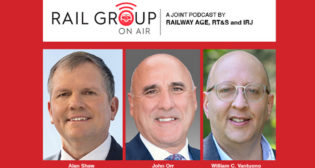
NMB Uncertainty Affects Rails, Labor
Written by Frank N. Wilner, Capitol Hill Contributing Editor
NMB Republican holdover Trey Fauth III is under SEC investigation—along with his wife’s brother, Sen. Richard Burr (R-N.C.)—into insider stock trades. Sen. Burr and his wife are alleged to have sold a portfolio of stock worth some $1.7 million ahead of a sharp and sudden drop in stock prices in February 2020, with Burr alleged to have acted on non-pubic information gained from his official duties. According to SEC filings, Fauth is alleged to have ordered the sale of much of his wife’s stock portfolio—stocks worth as much as $280,000—minutes after the sales by Burr and Burr’s wife and immediately following a phone call Fauth had with Burr.
The Senate Committee on Health, Education, Labor & Pensions last week favorably reported the nominations by President Joe Biden of Democrats Linda Puchala and Deirdre Hamilton, and Republican Gerald W. (Trey) Fauth III, to the three-member National Mediation Board, which administers the Railway Labor Act (RLA). Puchala and Fauth are renominees.
The next step is a Senate-floor confirmation vote. Assuming the three are confirmed, the NMB’s political majority will shift from Republican to Democratic, with current Republican Kyle Fortson departing in favor of Democrat Hamilton. Democrat Puchala and Republican Fauth, in holdover status, will gain renewed terms.

However, a current Securities and Exchange Commission (SEC) investigation into stock trades by Fauth could put his NMB future in jeopardy. If pressured to resign his seat, Senate Republicans would be loath to allow confirmation of two Democrats to the three-person NMB absent having a Republican as part of a confirmation package. Notably, the investigation is not now criminal in nature, but does put Fauth in jeopardy of civil penalties, according to news reports byProPublica and Law360.

The political majority of the NMB is of consequence to railroaders and their labor unions because the NMB provides mediation services for collective bargaining disputes, administers voluntary alternative dispute resolution programs such as final-offer arbitration, manages binding arbitration in settlement of contract interpretation, funds arbitration services, and recommends to the White House the appointment of arbitrators to Presidential Emergency Boards (PEBs) that make non-binding recommendations for settlement of stalled disputes over wages, benefits and work rules.

Intuitively and in fact, rail labor has more friends among Democrats, while railroads count more friends among Republicans.
The NMB’s controlling statute provides that the political party of the President may hold a 2-to-1 majority among NMB members. Yet almost a full year into Democratic President Joe Biden’s Administration, the Republican majority that existed under Donald Trump remains—and could remain throughout 2022 if the Senate does not confirm the two Democratic nominees.
Given that the current round of national bargaining—involving most Class I railroads and many smaller ones—over wages, benefits and work rules affecting some 125,000 rail workers represented by 12 unions is nearing an uncertain two-year mark, it matters which political party holds the NMB majority.
The RLA provides that neither a strike nor lockout may occur absent involvement of the NMB, which controls the collective bargaining process at every step. Only the NMB may declare a collective bargaining impasse, which sets in motion a series of cooling-off actions leading to creation of a PEB if there is still no voluntary settlement. That timing, controlled by the NMB majority—in addition to the NMB majority recommending PEB members—can favor labor or management.
For example, two of the 12 rail unions are now in NMB-controlled mediation—the Brotherhood of Maintenance of Way Employes and the Mechanical Division of the Sheet Metal, Air, Rail and Transportation Workers (SMART-MD), which combined represent some 20% of workers affected in this round of collective bargaining. The NMB can hold those two unions in mediation indefinitely pending voluntary settlement by the other 10 unions that are bargaining as part of a separate coalition, or declare a bargaining impasse for just one of the coalitions that could lead to a PEB and create a pattern for settlement by the others. Control of the timing as well as the actions can benefit either labor or management.
While PEB recommendations for settlement are non-binding, Congress—if the parties do not settle based upon those PEB recommendations—typically adopts them as part of a legislated back-to-work order, regardless of which political party controls the House and/or Senate.
National railroad shutdowns are considered so detrimental to the national economy that they have rarely been allowed to continue more than a few days, if that, and lawmakers consider them a third rail of politics. In 1991, for example, staunch labor allies, such as the late Sen. Ted Kennedy (D-Mass.), voted with Republicans to embrace and impose quickly the PEB recommendations even though they were more favorable to railroads. Kennedy called his vote “good for business.”
An NMB majority has other powers that can favor labor or management.
A Republican NMB member in 2004—Read Van de Water—sought unsuccessfully to shift the $1.2 million annual cost of arbitrator wages, travel and lodging from federal taxpayers to the railroads and their unions. Railroads are not only better able financially to shoulder such user charges, but would gain an incentive to maximize disciplinary actions against employees, and otherwise create additional contract interpretation disputes that, by statute, must be resolved through costly binding arbitration.
Such user charges could bleed to the point of exhaustion smaller union treasuries. And as the NMB controls disbursement of funds for arbitration, it also holds power to delay binding arbitration of minor disputes, which leads to union-employee disquiet. (The theory behind federal absorption of arbitration expenses is that the national economy benefits from fewer rail shutdowns and that it balances the loss by labor of a right to strike independent of NMB involvement.)
Another example of an NMB political majority tilting the labor-management playing field was in 2019, when the current Republican majority of Fauth and Fortson successfully advanced a rulemaking providing a straight-forward procedure for dissident union members to decertify their labor union. NMB members also have been known to push aside NMB mediators and take over the mediation process, sometimes threatening one of the parties to settle or risk being placed “on the shelf,” with no hope of an impasse being declared. As RLA contracts never expire, but continue in force until amended, this can freeze in place, for a lengthy time, existing wages, benefits and/or work rules, which, depending on the economic climate, can be hurtful to either party.
Current NMB members include Democrat Puchala, a former NMB mediator and Association of Flight Attendants (AFA) president, who is in her 12th year on the NMB; Republican Fortson, an attorney and former labor policy director for the Senate Health, Education, Labor & Pensions Committee, who is in her fourth year at the agency; and Republican Fauth, previously chief of staff to former Surface Transportation Board (STB) Republican member Wayne O. Burkes and a long-time rail shipper consultant, who is also in his fourth year at the agency.
Each is in holdover status and may remain indefinitely until a successor is Senate confirmed. This is unlike at the STB, where members are limited to two five-year terms and must depart at the end of their 12-month holdover year.
As for Democrat Hamilton, she is seeking a first term to succeed Republican Fortson. Hamilton is currently a Teamsters Union attorney and former legal counsel to the AFA. Her ascension to the NMB would give the agency two Democrats with AFA backgrounds.

Returning to Fauth, he is under SEC investigation—along with his wife’s brother, Sen. Richard Burr (R-N.C.)—into insider stock trades. Sen. Burr and his wife are alleged to have sold a portfolio of stock worth some $1.7 million ahead of a sharp and sudden drop in stock prices in February 2020, with Burr alleged to have acted on non-pubic information gained from his official duties. According to SEC filings, Fauth is alleged to have ordered the sale of much of his wife’s stock portfolio—stocks worth as much as $280,000—minutes after the sales by Burr and Burr’s wife and immediately following a phone call Fauth had with Burr. The FBI had obtained a search warrant for Burr’s cellphone.
As with Fauth, there are no current criminal actions pending against Burr. Although Burr—as a result of an earlier Department of Justice investigation into those stock trades—resigned his chairmanship of the Senate Intelligence Committee in 2020 when Republicans held Senate control, he retains his seat on the Health, Education, Labor & Pensions Committee. In fact, on Oct. 26, Burr participated in a voice vote recommending that the nominations of Fauth, Hamilton and Puchala be transmitted to the entire Senate for a confirmation vote. Burr said he intends to retire in 2022.
At that Oct. 26 Senate Health, Education, Labor & Pensions Committee mark-up hearing for Fauth, Hamilton and Puchala, Committee Chairperson Patty Murray (D-Wash.) said, “The Office of Government Ethics has reviewed all the nominees’ credentials and found they are in compliance with applicable laws and regulations governing conflicts of interest. These are all qualified nominees.”
Fauth declined to comment.

Railway Age Capitol Hill Contributing Editor Frank N. Wilner is author of seven books on railroad economics and labor relations, including “Understanding the Railway Labor Act,” published by Simmons-Boardman Books. Publication of his latest book, “Railroads & Economic Regulation,” is pending.



